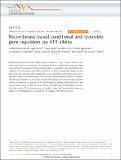Recombinase-based conditional and reversible gene regulation via XTR alleles
Author(s)
Robles-Oteiza, Camila; Yates, Travis; Cicchini, Michelle; Lauderback, Brian; Burds, Aurora A.; Winslow, Monte M.; Feldser, David M.; Taylor, Sarah E.; Cashman, Chris; Jacks, Tyler E; ... Show more Show less
DownloadRobles-Oteiza-2015-Recombinase-based.pdf (1.777Mb)
OPEN_ACCESS_POLICY
Open Access Policy
Creative Commons Attribution-Noncommercial-Share Alike
Terms of use
Metadata
Show full item recordAbstract
Synthetic biological tools that enable precise regulation of gene function within in vivo systems have enormous potential to discern gene function in diverse physiological settings. Here we report the development and characterization of a synthetic gene switch that, when targeted in the mouse germline, enables conditional inactivation, reports gene expression and allows inducible restoration of the targeted gene. Gene inactivation and reporter expression is achieved through Cre-mediated stable inversion of an integrated gene-trap reporter, whereas inducible gene restoration is afforded by Flp-dependent deletion of the inverted gene trap. We validate our approach by targeting the p53 and Rb genes and establishing cell line and in vivo cancer model systems, to study the impact of p53 or Rb inactivation and restoration. We term this allele system XTR, to denote each of the allelic states and the associated expression patterns of the targeted gene: eXpressed (XTR), Trapped (TR) and Restored (R).
Date issued
2015-11Department
Koch Institute for Integrative Cancer Research at MITJournal
Nature Communications
Citation
Robles-Oteiza, Camila, Sarah Taylor, Travis Yates, Michelle Cicchini, Brian Lauderback, Christopher R. Cashman, Aurora A. Burds, Monte M. Winslow, Tyler Jacks, and David M. Feldser. “Recombinase-Based Conditional and Reversible Gene Regulation via XTR Alleles.” Nat Comms 6 (November 5, 2015): 8783. © 2015 Macmillan Publishers Limited
Version: Final published version
ISSN
2041-1723